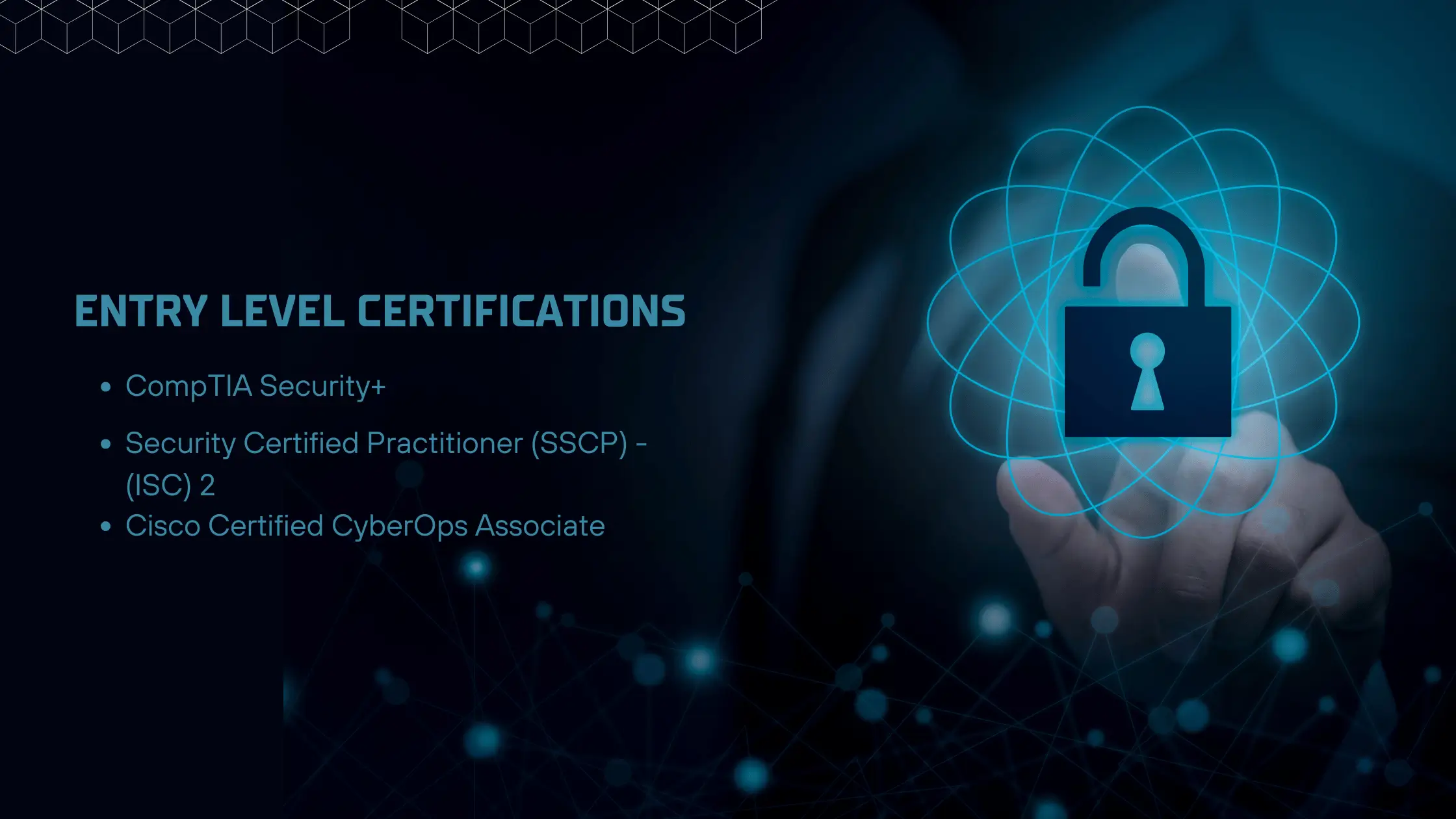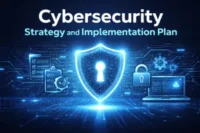Top Cybersecurity Certifications: 20 Best Career Paths
Published: 1 Aug 2025
Cybersecurity is one of the most rapidly developing spheres in the world. The digital threats are becoming more intelligent and more challenging to identify daily. That is why there is a high demand for skilled cybersecurity professionals. Certifications are significant in this aspect. They show your skills, increase your knowledge, and help you to be outstanding in job applications.
Certification can open new opportunities to you as a student, IT worker, or a person thinking of changing their career. This blog will explore top cybersecurity certifications based on your experience level, from beginner to expert. There will also be cloud and platform-specific certifications. Throughout this process, you’ll be provided with guidance and suggestions to assist you in making the best choice.
The U.S. Bureau of Labor Statistics predicts that the number of information security analysts will increase by 35 percent between 2021 and 2031, which is much higher than the growth of other jobs. The rising complexity and number of cyberattacks contribute to this.
Top Cybersecurity Certifications
1. Entry Level Certifications

The certifications are perfect for starting a career in cybersecurity as a beginner. They inculcate values, and they do not demand work experience beforehand.
CompTIA Security+
It is one of the most demanded entry-level certifications. It discusses the fundamentals, such as threats, attacks, risk management, cryptography, etc. Employers require this certification in many job adverts. Security+ + is a typical certification in any profession and a typical certification for entry-level cybersecurity jobs. Such organizations accept it as the U.S. Department of Defense, which requires it of IT security professionals. The median wage of the professionals holding this certification is 65,000-85,000 dollars annually, depending on the job and experience.
| Tip |
|---|
Hands-on labs enable you to practice what you learn and become better in a shorter period. |
Security Certified Practitioner (SSCP) – (ISC) 2
This certification is suitable for those who are new to IT security. It has access control, operations, and incident response. It is based on the Common Body of Knowledge (CBK), which includes all the knowledge a security expert must possess.
The typical annual income for individuals holding SCP certification is $94,000.By 2024, the world will lack cybersecurity professionals, and the required number of professionals is almost 4.8 million, This is why the SSCP certification serves as a powerful tool for advancing your career in IT security.
Cisco Certified CyberOps Associate
This certification will prepare you to be employed in a security operations center (SOC). It educates on surveillance, tracking, and cyber attacks prevention. It is a good place to start when you want to learn about real-time threat analysis.
2. Professional Level Certifications (Mid-level)
Certified Ethical Hacker CEH
This certification will make you think like a hacker, but in a reasonable manner. You will have an impression of penetration testing, hacking tools, and management of security vulnerabilities. EC-Council offers it, to pass the exam, you must study more by attending an official EC-Council training.
Certified Ethical Hackers (CEH) play a significant role in assisting businesses in detecting and eradicating vulnerabilities in their systems before hackers exploit them. The demand for EH professionals is very high, and many of the leading organizations, like the FBI and Microsoft, need these professionals. In the U.S., the average wage of a CHE-certified worker is about $95,000 annually.
CND – Certified Network Defender
CND is an excellent course for IT professionals who want to secure networks. It will show how to identify and prevent network threats, assess risk, and protect communication channels.
GSEC – GIAC Security Essentials
GSEC is a course that is meant to be taken by professionals who already possess some knowledge. It involves securing networks and systems, managing risks, and responding to incidents. It is a real-life certification.
CSE – Check Point Certified Security Expert
This certification is for advanced configurations of the firewall and VPN. It is beneficial to security experts who operate Check Point security systems.
3. Expert Level Certifications (Advanced)
Information Systems Security Professional ISSP
This world-renowned certification is concerned with information security and risk management. It is ideal for professionals in leadership or strategic positions. It is a broad subject area in the Common Body of Knowledge (CBK). FCISSP is among the most globally recognized certifications in the sphere of cybersecurity, and such industry giants as IBM, Cisco, and Microsoft promote it.
CISSP-certified professionals are sought after as leaders in such positions as Chief Information Security Officer (CISO). A CISSP-certified professional has an average salary of about $120,000 annually, with senior positions exceeding $150,000.
CISM -Certified Information Security Manager
CISM is ideal for those who oversee a company’s information security program. ISACA provides it and is very prestigious across the globe. CISM is suitable for those professionals who want to take up leadership positions.
It involves overseeing and managing an organization’s information security program. According to the data of 2024, the average salary of CISM-certified specialists is 125,000 dollars per year. Still, the wages of executives responsible for managing cybersecurity programs are much higher.
CISA -Certified Information Systems Auditor
CISA focuses on auditing, evaluating, and managing information systems, making it ideal for ensuring compliance and conducting IT audits.
CASP+ – CompTIA Advanced Security Practitioner
CASP+ is a high-level security certification. It is concerned with enterprise security, high end incident response, risk analysis.
OSCP – Offensive Security Certified Professional
It is an ethical hacking and penetration testing professional certificate. It is perfect as a red teamer and a higher-level security tester.
GIAC Certified Incident Handler – GCIH
GCIH provides the knowledge on how to identify, react to, and recover from cyberattacks. It is excellent at the SOC level and response teams.
GIAC – Enterprise Defender
GCED is designed to suit the defenders in large organizations. It is concentrated on layers of protection, surveillance, and network traffic analysis.
Also Read: Cybersecurity vs Software Engineering: Which One Should You Choose?
4. Cloud and Platform Certifications
CSP -Certified Cloud Security Professional
It is a certification provided by ISC 2 to security professionals who work in the cloud. It is fantastic when it is accompanied by AWS or Azure certifications.
AWS Certified Security – Specialty
This cert has to do with AWS cloud security. It is equipped with cloud resources monitoring, logging, and security.
Azure Security Engineer Associate (Microsoft Certified)
This is for practitioners who handle security in Microsoft Azure. It has network security, identity management, and threat protection.
Palo Alto Networks Certified Network Security Engineer PCNSE
This platform-specific cert is aimed at configuring firewalls, security policies, and threat detection with the help of Palo Alto systems.
The Proper Way of Choosing the Certification
Ensure your certification matches your career objectives. For example, if you want to hack ethically, take a CEH course. CISM or CISSP is the best choice if you want to become a leader. Newcomers are also advised to pursue CompTIA Security+ or SSCP. It is always advisable to check job advertisements to learn what employers desire in your area.
If you like to be a Penetration Tester? Then begin with CEH and progress to OSCP.
If you want to work in Security Management? Then start with GSEC or Security+ and then move to CISM or CISSP.
FAQs
CompTIA Security+ is ideal for beginners, while CISSP and OSCP are top-tier choices for advanced or specialized roles.
Yes, you can build strong fundamentals in 3 months with daily practice, but true mastery takes more time and real-world experience.
Absolutely, it boosts your credibility, opens job opportunities, and proves your commitment in a competitive field.
Conclusion
The demand for cybersecurity professionals is expected to grow 35% from 2021 to 2031, making Top Cybersecurity Certifications essential for career advancement. These certifications will help you acquire the required skills, whether you are new to the field and need to start with base-level certifications such as CompTIA Security+, or you are ready to become a leader in the field and need to become a CISSP. Certifications like CEH and GSEC are pragmatic, and CISSP and CISM will result in better jobs. To be able to pursue your career in cybersecurity, you have to keep up to date and keep learning.

- Be Respectful
- Stay Relevant
- Stay Positive
- True Feedback
- Encourage Discussion
- Avoid Spamming
- No Fake News
- Don't Copy-Paste
- No Personal Attacks

- Be Respectful
- Stay Relevant
- Stay Positive
- True Feedback
- Encourage Discussion
- Avoid Spamming
- No Fake News
- Don't Copy-Paste
- No Personal Attacks





